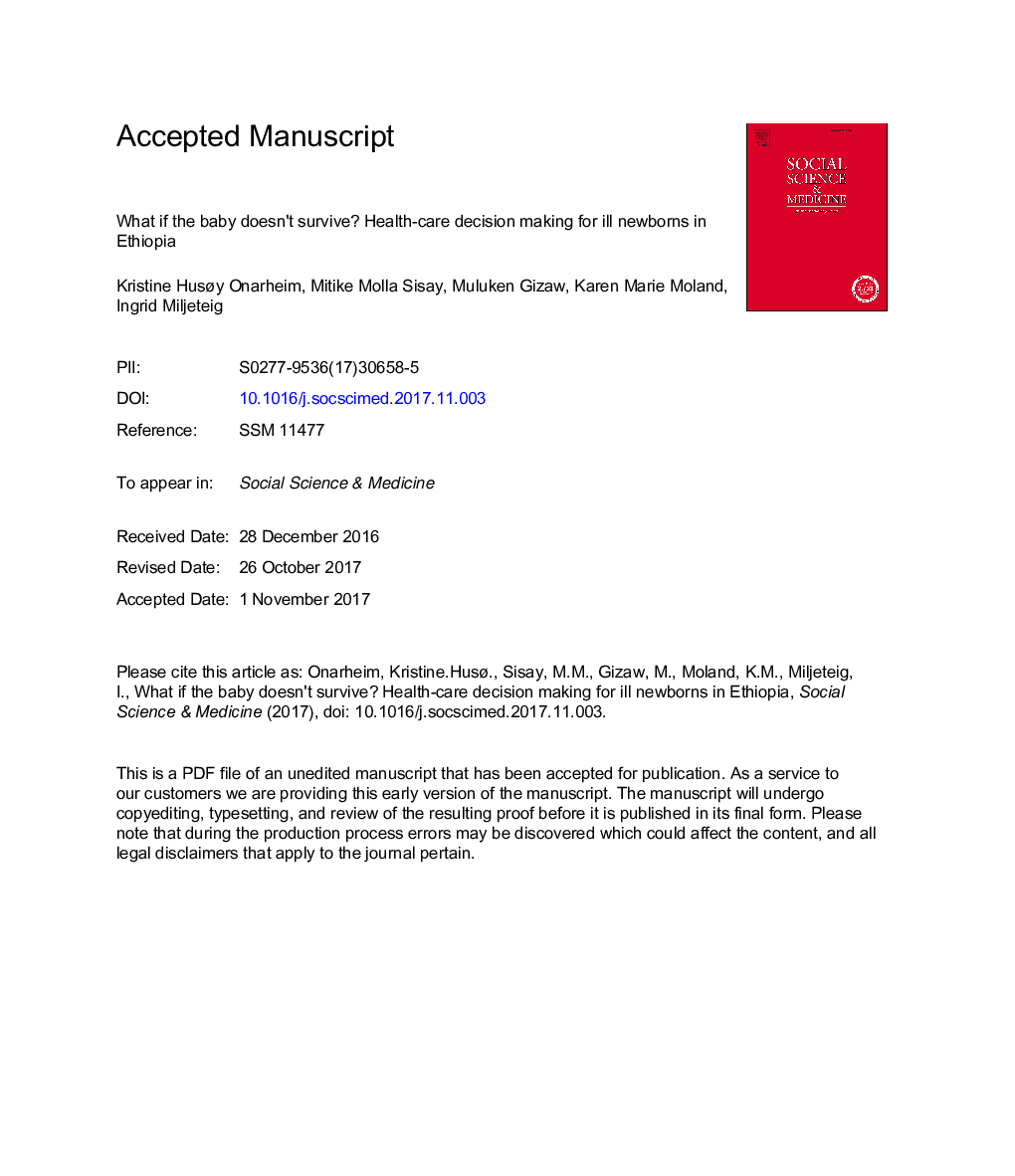| کد مقاله | کد نشریه | سال انتشار | مقاله انگلیسی | نسخه تمام متن |
|---|---|---|---|---|
| 7328860 | 1475974 | 2017 | 38 صفحه PDF | دانلود رایگان |
عنوان انگلیسی مقاله ISI
What if the baby doesn't survive? Health-care decision making for ill newborns in Ethiopia
ترجمه فارسی عنوان
اگر کودک نتواند زنده بماند چه؟ تصمیم گیری در مورد مراقبت های بهداشتی برای نوزادان بیمار در اتیوپی
دانلود مقاله + سفارش ترجمه
دانلود مقاله ISI انگلیسی
رایگان برای ایرانیان
کلمات کلیدی
اتیوپی، سلامت نوزادان، مراقبت های بهداشتی، تصمیم سازی، شخصیت، فقر، تحقیق کیفی،
موضوعات مرتبط
علوم پزشکی و سلامت
پزشکی و دندانپزشکی
سیاست های بهداشت و سلامت عمومی
چکیده انگلیسی
Despite efforts to improve access to and quality of care for newborns, the first month after birth remains the most dangerous period of life. Given high neonatal mortality in low-income countries, saving newborn lives is a key priority for global and national health policy agendas. However, little is known about how these policies resonate with local understandings, experiences and household priorities. In this qualitative study we examined families' decision making and health-care-seeking in Butajira, Ethiopia. Data were collected through observation in hospital, in-depth interviews (41), and focus group discussions (7) with family members, health-care workers, and community members (October-November 2015). Transcripts and field notes were analyzed inductively using qualitative content analysis. Findings indicate that newborn health was not always the family's priority. Local perceptions of newborns as not yet useful members of the household alongside costly health-care services delayed decision making and care-seeking. While sickness was recognized as dangerous for the ill newborn, seeking health-care could be harmful for the economic survival of the family. In a resource-constrained setting, families' focused on productive assets in order to minimize long-term risks, and waited before seeking newborn health-care services. Until the baby had survived the first vulnerable weeks and months of life, the unknown newborn was not yet seen as a social person by the community. Personhood evolved progressively as the baby became a part of the family. A newborn death was surrounded by silence, and families received minimal support from traditional financial associations, iddirs. Decisions regarding health-care were contingent upon families' understandings of newborns and their resource-constrained circumstances. Improving newborn health involves recognizing why families choose to (not) seek health-care, and their actual opportunities and constraints in making such decisions. The everyday realities of vulnerable newborns must be at the center of global and national policy discussions and local implementation.
ناشر
Database: Elsevier - ScienceDirect (ساینس دایرکت)
Journal: Social Science & Medicine - Volume 195, December 2017, Pages 123-130
Journal: Social Science & Medicine - Volume 195, December 2017, Pages 123-130
نویسندگان
Kristine Husøy Onarheim, Mitike Molla Sisay, Muluken Gizaw, Karen Marie Moland, Ingrid Miljeteig,
